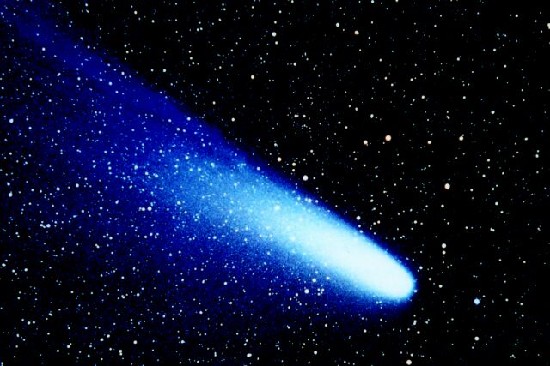(单词翻译:单击)
But let's pretend again that we have made it to the Oort cloud. The first thing you might notice is how very peaceful it is out here. We're a long way from anywhere now—so far from our own Sun that it's not even the brightest star in the sky. It is a remarkable thought that that distant tiny twinkle has enough gravity to hold all these comets in orbit. It's not a very strong bond, so the comets drift in a stately manner, moving at only about 220 miles an hour.
但是,我们再作一次假设:我们已经到达奥尔特云。你首先注意到的是,这里非常宁静。现在,我们离哪个地方都非常遥远--离我们自己的太阳那么遥远,它甚至算不上是天空里最明亮的星星。想一想啊,远处那个不停闪烁的亮点是那么微小,却有足够的引力拖住所有这些彗星,这真是不可思议。这种引力并不很强,因此这些彗星只是很壮观地慢慢移动,速度大约仅为每小时354公里。

From time to time some of these lonely comets are nudged out of their normal orbit by some slight gravitational perturbation—a passing star perhaps. Sometimes they are ejected into the emptiness of space, never to be seen again, but sometimes they fall into a long orbit around the Sun. About three or four of these a year, known as long-period comets, pass through the inner solar system.
由于引力的细微摄动--也许是由于一颗路过的恒星,在这些孤独的彗星中,不时会有一颗被推出正常轨道。有时候,它们被弹进空荡荡的空间,再也没有踪影。但是,有时候它们会进入围绕太阳的漫长轨道。每年大约有三四颗这类彗星,即所谓的长命彗星,从太阳系里侧行通过。
Just occasionally these stray visitors smack into something solid, like Earth. That's why we've come out here now—because the comet we have come to see has just begun a long fall toward the center of the solar system. It is headed for, of all places, Manson, Iowa. It is going to take a long time to get there—three or four million years at least—so we'll leave it for now, and return to it much later in the story.
这些迷途的访客只是偶然会撞上坚硬的东西,比如地球。这就是我们现在到这里来的道理--因为我们见到的那颗彗星刚刚开始朝着太阳系的中央经历漫长的坠落过程。在这么多的地方中,它的方向偏偏是艾奥瓦州的曼森。它要花很长时间才能抵达那里--至少三四百万年--因此我们先把它搁置一下,到本书快要结束时再来讨论它。


